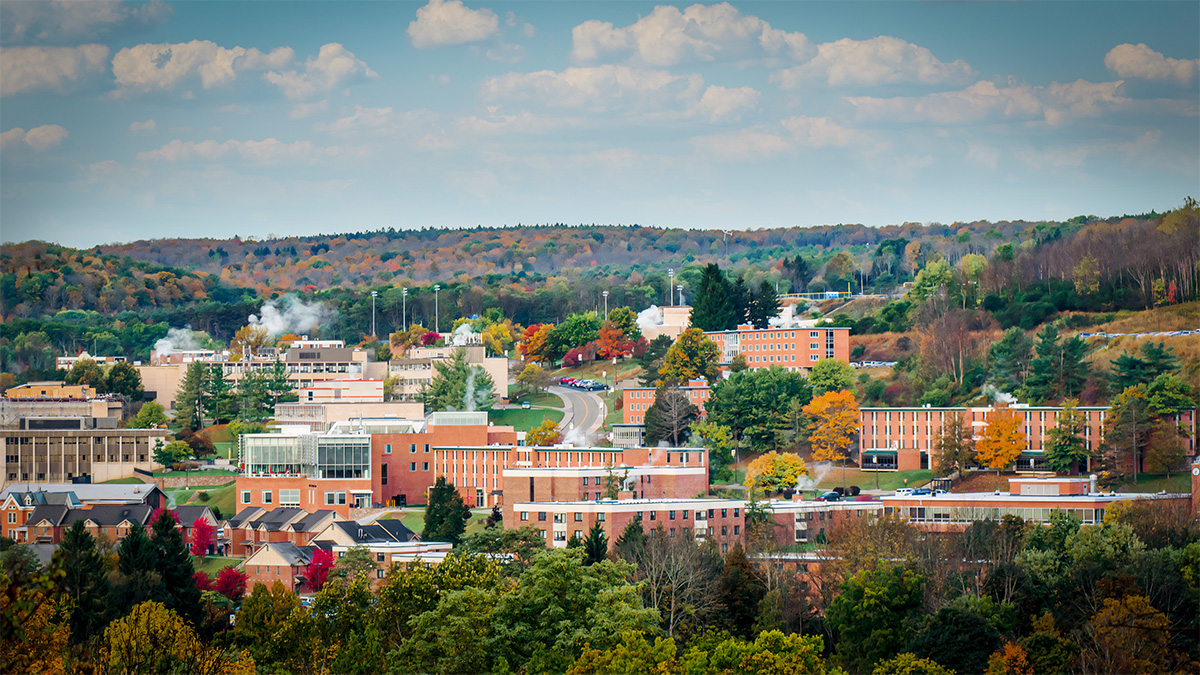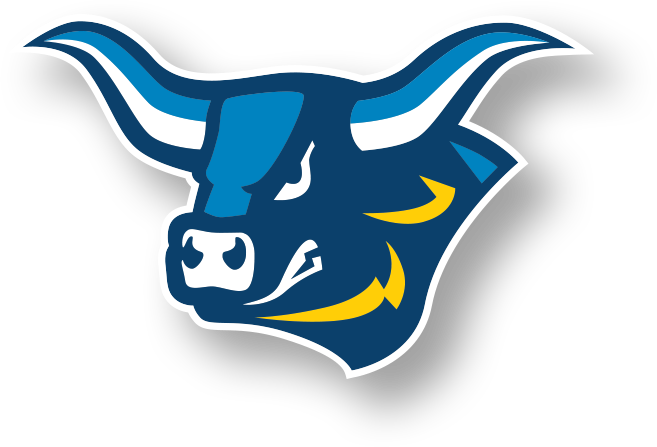
At a glance
Getting nutritious, tasty, fresh, and appealing meals on the table every day at the Alfred State College campus is a challenging affair. It means developing recipes, planning menus, locating and ordering large quantities of foodstuffs, preparing the food, and serving it to customers at the right temperature - all while maintaining the quality and safety of the food.

Getting nutritious, tasty, fresh, and appealing meals on the table every day at the Alfred State College campus is a challenging affair. It means developing recipes, planning menus, locating and ordering large quantities of foodstuffs, preparing the food, and serving it to customers at the right temperature - all while maintaining the quality and safety of the food.
While balancing nutrition, taste, eye appeal, and cost, Karen Canne, director of Dining Services for Auxiliary Campus Enterprises and Services, Inc. (ACES), stands between 3,000 students and the nearest fast food restaurant. And she's winning the battle with the help of a small group of on-campus farmers.
ACES is a not-for-profit corporation that supports the mission of Alfred State College. Located on campus, ACES provides dining services, campus bookstores, transportation, vending, and laundry services to their student and faculty customers.
Most of the food served by Dining Services is grown on corporate farms, far away from the Alfred campus. Using chemical fertilizers, bioengineering, and a lot of natural resources and their by-products, students can eat fresh produce all winter. It's what all Americans have come to expect, but what if there were a better, less environmentally damaging, and tastier alternative? What if Canne could entice her student population to be conscious of their nutrition and ramp-up their intake of fresh, locally grown foods?
Enter Alfred State's newest agricultural initiative: The Center for Organic and Sustainable Agriculture (COSA).
The mission of COSA at Alfred State is to facilitate learning, conduct applied research, and engage communities in the practices of sustainable food and energy production, according to Matthew Harbur, PhD, COSA program director. Dr. Harbur is an associate professor in the School's Department of Agriculture and Horticulture.
Helping to fulfill some of the college's food supply requirements has become a major initiative and teaching tool for COSA. Working with Canne and the ACES team has become a study in developing a sustainable food plan right in the college's backyard.
Beginning in January 2007, as the mission for the new Center was being developed, Harbur approached Canne with the possibility of recruiting Dining Services as a customer for the Center.
"I believe strongly that our students need to see the entire business cycle to make their education truly worthwhile," Harbur said. "It makes no sense to teach them how to grow the produce without letting them work the entire market cycle. They need to know how to package, market, and sell what they have grown."
As a newcomer to Alfred, Harbur anticipated a long sales and negotiation cycle to get the ACES team involved. He was extremely surprised to find just the opposite. Canne and ACES Executive Director Thomas Massara were on-board immediately.
"I was prepared to spend a lot of time breaking down institutional barriers and explaining the benefit of our plan," Harbur said. "But Tom and Karen were very responsive and in some ways I had to catch up with them."
"We are always looking at ways we can support the campus and improve product for our students," Canne said. "Matt's idea was a perfect match for both of us."
With just a verbal agreement between the two organizations, Harbur's students began to plant; their efforts had to be timed to meet the food supply requirements of the fall semester. Using a grant from a campus committee co-chaired by Canne, the Center bought seeds and started planting.
"Because we are a small organization, we were able to cut through the red tape and the approval cycles and just make it happen," Canne said. "In the beginning, we didn't even have a price negotiated between Matt and ACES. We just agreed that we would work it out when we understood the volume, quantity, and quality of what the Center was providing us."
Through the summer and early fall 2007, Harbur and his team sweated the details. They felt they had set a high bar for themselves with ACES and this was the first time that this group
of students and researchers were working in production mode.
During the growing cycle, Canne and Harbur did a lot of nibbling on the greens to make sure that they passed the student palette taste test - a critical part of the need to make the Center's output marketable.
"Dr. Harbur and I would walk through the garden trying out each type of lettuce," Canne said. "We tasted probably 12-15 lettuces and I'm not a big fan of lettuce!"
This task was important to make sure that Dining Services didn't end up serving things that grew really well, but that would not be pleasing to their customers, Canne said.
Then, during fall Semester 2007, the Center began supplying organic greens, squash, tomatoes, and fresh herbs for Dining Services. Special events are also supplied with greens and other produce as they are available.
COSA students are responsible for harvesting, grading, trimming, packaging, and delivering the produce to Dining Services from the garden. Since everything is grown about a mile from the ACES kitchen, delivery must be planned and executed to coincide with other food deliveries. Weeks prior to the harvest, Canne and Harbur meet to determine the type and quantity of the produce that is supplied to Dining Services within a given timeframe.
Delicate herbs are also delivered in their growing pots to the kitchen facilities. Because herbs are so perishable and typically only used as garnish and accent, the cooks snip the plants as needed. When the potted plant is 2/3 used, the entire pot is returned to the Center and a new potted plant is delivered to the kitchen.
Having the ability to source year-round reliable supplies of fresh vegetables from the COSA program is expected to be a key element of the food sourcing plan for Canne and her team.
"We've always tried to support local farmers by requesting that our distributors source locally," Canne said. "What is unique about our relationship with COSA is that we will be able to literally skip the middle man and improve nutritional quality, reduce consumption of fuel for transporting the food to us, and support our ASC students."
And there is always that cost factor to contend with. According to Canne, organic
produce is generally priced between 20-30 percent more than non-organic products. After the
COSA vegetables became a regular part of the menu plan for Dining Services, Harbur and Canne agreed on a price that reflected the marketplace.
According to Canne, the benefits that they receive far outweigh the added costs.
"This is a way to help our ag students, boost the nutritional value of our dining hall output, bolster the Center, help our ecology, and support our local economy," she said.
Harbur and Canne agree that there are some challenges to the new arrangement between the organizations.
Despite careful planning, as with all businesses, things happened that required creativity and flexibility on the part of both supplier and customer. For instance, in October, Dining Services expected 30 pounds of greens to be delivered for an event. But, come harvest time, only 10 pounds were of acceptable quality. The students themselves identified the problems during the selection process and had to break the bad news to Canne.
Canne quickly ordered more lettuce from the produce vendor to make up for the shortfall and a salad-less meal was averted due to honest communication and quick response.
Then came the squash deluge - the same one that almost every home gardener faces: What do to with 120 pounds of squash?
Canne said that Dining Services worked hard to be able to use that lovely yellow stuff in creative ways.
"We used old standard recipes and researched creative recipes to try to use it up," Canne laughed. "Layered squash casserole was on the menu frequently. Then we found a wonderful bread recipe that helped use it up."
Canne also called on her counterpart at Alfred University and the department chair of the Culinary Arts Program at Alfred State's Wellsville Campus who also agreed to buy and use some of the bounty. These other organizations could well become customers of the program in the future, Harbur said.
This close-to-consumer production and consumption model is exactly what sustainable agriculture is all about.
Sustainable Food Chain
"Sustainable agriculture has many advantages," Harbur explained. "It saves on natural resources, it promotes a healthier lifestyle, and it encourages the consumption of high quality vegetables with few pesticides. It also encourages and supports local suppliers; long-term we hope to encourage the redevelopment of the family farm."
"Dining Services has the powerful ability to implement positive change in the COSA-Alfred local food system," Harbur said. "By working with the COSA team to create a market for our goods, they are promoting the health of their student customers by providing nutritious fresh foods, they are reducing the use of costly natural resources, and they are supporting our agriculture students and supporting our local organic growers. Their impact and influence has really been enormous."
